Share
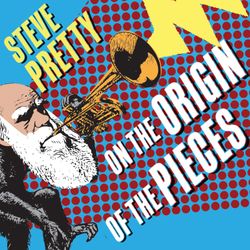
Steve Pretty On The Origin of the Pieces
Helping you to hear and understand music in new ways
Latest episode
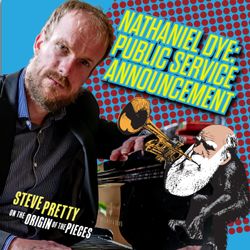
38. Nathaniel Dye: Public Service Announcement
55:13||Ep. 38In this episode, I’m dedicating the show to Nathaniel Dye — musician, music teacher, brass band obsessive, ultramarathon runner, and one of the most quietly extraordinary people I’ve met. We begin with Nat performing his song “Public Service Announcement” (recorded live at my Wilton’s Music Hall show in November 2024) — a funny, furious, razor-sharp call to take bowel cancer symptoms seriously.Nat sadly died recently from complications related to bowel cancer. This episode is part tribute, part replay, part attempt to hold onto the actual substance of what he stood for: making things, teaching people, and choosing music — not as escapism, but as a meaningful way to use the time you’ve got.You’ll also hear excerpts from my “Listen like a musician” series, and then a replay of my earlier interview with Nat (from Episode 10), where he talks about his diagnosis, his fundraising, his trombone marathon plans, and what music became for him after everything changed.In this episodeNat’s live performance of “Public Service Announcement” Why he threw himself back into teaching and music-making after treatment The story behind Bowel Cancer Bucket List and the fundraising workA replay of our earlier chat: music, mortality, and doing the thing anywayThe episode outro: Nat’s music, accompanied by bass/tuba greats Guy Pratt and Theon Cross Links & referencesBowel Cancer Bucket List (Nat’s site + donation links): bowelcancerbucketlist.comMatters of Life and Death (album page): Bowel Cancer Bucket List – album page Matters of Life and Death (Spotify): Spotify album link“Public Service Announcement” (Spotify track): Spotify track linkDonate to Macmillan Cancer Support: Macmillan donation page Guy Pratt: guypratt.comTheon Cross who appears in Nat's closing song too: theoncross.com Stay musically curious.
More episodes
View all episodes
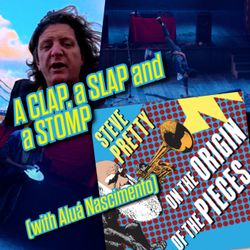
37. A Clap, a Slap and a Stomp (with Aluá Nascimento)
38:29||Ep. 37Episode 37 - A clap, a Slap and a StompWhat actually is musical time? In this episode, Steve kicks off 2026 with the first four days of his “12 Days of Listening” mini-series — all about pulse, groove, and how our brains latch onto patterns (sometimes to our advantage, sometimes not).Then we jump to Wilton’s Music Hall (January 2025) for a live guest spot from Aluá Nascimento — Brazilian percussionist, multi-instrumentalist, and former STOMP cast member — starting with a trumpet + pandeiro duet on “Brazil” and expanding into body percussion, Afro-Brazilian rhythm traditions, and the wonderfully low-tech joy of making music out of whatever’s around.Along the way, Aluá talks about growing up around capoeira, how culture and history shaped these sounds, and demonstrates instruments including berimbau (musical bow), caxixi (shaker), and pandeiro — with a bit of audience participation thrown in too.In this episodeA practical listening upgrade: pulse vs rhythm (try it while walking)“The pocket”: groove as micro-timing, not just the patternWhy your brain is basically a pattern-hunting drummerShared time / entrainment: why humans sync up (and why it matters in music)Live at Wilton’s: trumpet + pandeiro on “Brazil”Aluá’s story: capoeira roots, Afro-Brazilian traditions, and the STOMP yearsInstruments you’ll hear: body percussion, pandeiro, berimbau, caxixi (and more)Find AluáInstagramBeat Goes On (bio + workshops)Watch: Aluá Nascimento & Helene Jank – Body Music (YouTube)Also in this episodeSteve mentions Episode 36 (breaking down how the My Friend Maisy theme was made)Wilton’s Music Hall shows: 24th January — kids/family show at 2pm, evening show at 7pmSupport the showExplore episodes, transcripts, and more: originofthepieces.comJoin the Patreon: patreon.com/StevePrettyOnTheOriginofthePiecesIf you enjoyed this one, share it with a musically curious human (it helps more than you’d think)Stay musically curious!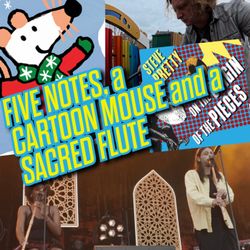
36. Five Notes, Maisy Mouse and a Sacred Flute
40:03||Ep. 36From a Colombian ritual flute heard backstage at Oslo Mela to a children’s TV theme tune played on a London school playground, this episode explores why pentatonic scales turn up everywhere — and why they feel so immediately playable, memorable, and emotionally direct. Along the way, Steve unpacks the thinking behind the theme tune he wrote for My Friend Maisy (also available on NOW), based on the books by Lucy Cousins, and how five carefully chosen notes can shape an entire musical world.The episode takes a gentle detour into Colombian traditional music with a backstage conversation recorded in 2024 with El León Pardo of Mestizo Collective, exploring the gaita — a ritual wind instrument built around paired male and female voices, deep cultural symbolism, and tightly limited pitch material. That sound becomes a useful reference point for the episode’s main thread: how scales function less like theory and more like palettes of identity.Back in TV land, Steve breaks down the Maisy theme in detail, showing how pentatonic scales sit at the heart of children’s musical toys, playground instruments, and early musical experiences — and why avoiding semitone clashes makes music feel instantly safe, inclusive, and playable. Using live demonstrations, playground recordings, and some creative repitching in Melodyne, the episode shows how tiny changes to a scale can completely transform a melody’s emotional character.In this episode:• A backstage conversation with León Pardo about the Colombian gaita, its ritual use, construction, and sound-world.• How male and female gaita flutes are paired, and what that reveals about musical identity.• Why pentatonic scales appear in folk traditions, playground instruments, and children’s musical toys worldwide.• A breakdown of the theme tune Steve wrote for My Friend Maisy, based on the books by Lucy Cousins.• Why playground bells and boomwhackers are almost always pentatonic — and why that matters.• A live experiment repitching the Maisy theme into an Ethiopian-inflected pentatonic.• Why thinking of scales as identities or colour palettes can make musical listening feel less intimidating.Also in this episode, Steve reflects on why many people drift away from music when theory becomes detached from sound — and why listening itself is a learnable, creative skill, whether or not you play an instrument.Plus details of the upcoming Steve Pretty On the Origin of the Pieces live shows at Wilton’s Music Hall on 24th January, including the first ever Origin KIDS matinee at 2pm and the evening show at 7pm. Full details and tickets at originofthepieces.com/live.🎧 Listen, rate and share to help more musically curious ears find the show.💻 More episodes, transcripts, and extras atoriginofthepieces.com🪶 Patreon:patreon.com/StevePrettyOnTheOriginofthePiecesStay musically curious.
35. Mulatu Astatke, Ethio-jazz and Pentatonic Worlds
48:39||Ep. 35From Addis to the Barbican and back again, this episode dives into the sound-world shaped by Mulatu Astatke — the father of Ethio jazz. With Mulatu having recently completed his farewell tour, Steve goes back to a long, previously-unreleased interview he recorded with him during the making of Hackney Colliery Band’s Collaborations: Volume One. What emerges is a portrait of a true pioneer: a composer trained in London and at Berklee, a collaborator with Duke Ellington, and the architect of a style heard across film soundtracks, samples and stages worldwide.Expect discussions of Ethio jazz’s roots in traditional modes and tribal instruments; a journey through pentatonic and diminished scales; and Mulatu’s deep reflections on African musical heritage and collaboration. There’s even a live extract of Derashe from HCB’s Barbican show — the tune he discusses in the interview.In this episode:• How Mulatu fused Ethiopian pentatonic traditions with jazz harmony and improvisation.• Why some Ethiopian tribes use diminished (whole–half) scales, and how that changes the emotional palette.• The story of Duke Ellington’s Jazz Ambassadors tour — and how Ellington ended up performing one of Mulatu’s arrangements in Addis.• The embilta, washint and other Ethiopian wind instruments that parallel trumpets, trombones and baritone sax.• The link between African “bush” instruments, mbira/“African piano” traditions, and Western harmonic thinking.• A rare 2018 interview captured at Livingston Studios during the HCB/Mulatu recording sessions.• A live performance of Derashe from the Barbican, featuring Hackney Colliery Band and Mulatu Astatke.Also in this episode, Steve welcomes listeners from the New Scientist Podcast and explores the science–music crossover behind shell acoustics, underwater sound, and the physics of musical evolution. Plus a reminder that the new Origin of the Pieces website now includes full transcripts, an interactive world-map archive of every episode, and a growing library of extras.And don’t miss the upcoming Wilton’s Music Hall shows on 24th January 2026, including the first ever Origin KIDS matinee at 2pm and the evening performance at 7pm. TICKETS.🎧 Listen, rate and share to help more musically curious ears find the show.💻 More episodes and extras at originofthepieces.com🪶 Patreon: https://patreon.com/StevePrettyOnTheOriginofthePieces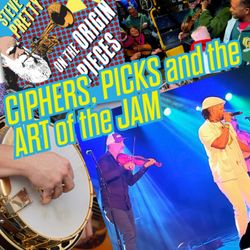
34. Ciphers, Picks and the Art of the Jam
53:52||Ep. 34From the high lonesome sound of Appalachia to the flow of a Bronx cipher, this episode explores what happens when two traditions of storytelling and rhythm collide. Recorded at the WOMEX 2024 world-music gathering in Finland, Steve talks with Gangstagrass — the trailblazing American group fusing bluegrass instrumentation with hip-hop lyricism and beats.Expect fiddles, banjo and beats; live sessions that blur the line between folk jam and freestyle; and a conversation about community, curiosity and the shared language of groove. There’s even a spontaneous rap about Origin of the Pieces and a bus-ride performance that somehow turned into a cipher on wheels.In this episode:How Gangstagrass blend banjo, fiddle and MCs without losing the soul of either style.Why hip-hop ciphers and bluegrass picks are closer than you might think.The jam session as a universal language — connecting folk musicians, rappers and improvisers worldwide.How genre boundaries were drawn by history, and how artists can redraw them.A stripped-back version of Do Better plus a freestyle that plugs their UK tour entirely in rhyme.Gangstagrass UK Tour — November 2025Also in this episode, Steve launches the new Origin of the Pieces website — featuring full transcripts, an interactive world-map archive, the Darwin-trumpet T-shirt shop, and exclusive extras via Patreon.And don’t miss the upcoming Wilton’s Music Hall shows on 24 January 2026, including the first ever Origin KIDS matinee and an evening performance featuring new guests and experiments in sound.🎧 Listen, rate and share to help more musically curious ears find the show.💻 More episodes and extras at originofthepieces.com🪶 Patreon: patreon.com/StevePrettyOnTheOriginofthePieces
33. Malawian Madalitso, Vampire Vamps & Sofa Songs
31:06||Ep. 33From living-room experiments to Malawian street stages — and a brief stop-off in Transylvania.This week, Steve explores what it means to sing what you see: making music that’s spontaneous, handmade and gloriously human. There’s a Halloween detour into his live Nosferatu score, a new Clip n Mix, and a look at the brilliant Madalitso Band from Malawi — two musicians whose home-built instruments and hypnotic grooves turn simplicity into joy.Plus: the mystery of a slightly windy theme tune proves that accidents can be the best kind of inspiration.👇 Full timestamps + links below!⏱️ Chapters00:00 – A suspiciously familiar theme02:30 – Living-room experiments & musical accidents06:40 – Clip n Mix – turning everyday sounds into music10:45 – Vampire Vamps: Nosferatu score (watch)16:30 – Introducing Madalitso Band (Malawi)22:00 – Homemade instruments & street recordings32:00 – Singing what you see44:30 – Finding beauty in simple sounds55:20 – Wilton’s shows, Patreon & Universe of Music tour🔗 Links & Extras🎧 Listen / WatchYouTube | Apple Podcasts | More platforms🎬 Nosferatu live score → Full video🎛 Support / Extras → Patreon🪐 Universe of Music Tour (with Chris Lintott)Corsham (20 Nov) | Cambridge (27 Nov) | Shoreham-by-Sea (15 Jan)🎟 Full info → universeofmusic.co.uk🎟️ Live at Wilton’s Music Hall – 24 Jan 2026👨👩👧👦 KIDS matinee (2 pm) – interactive family show🌙 Evening show (7 pm) – live podcast with guests & musical surprises💸 Code SPRETTY15 = £15 best available seatsBook Kids | Book Evening💬 Got a weird sound you’d like Steve to turn into music? Email podcast@stevepretty.com or comment with #ClipnMix.🙌 Like, subscribe & stay musically curious.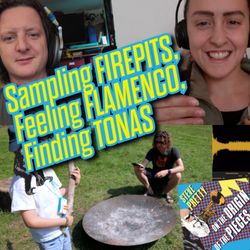
32. RE-UPLOAD: Sampling Firepits, Feeling Flamenco, Finding Tonás
52:43||Ep. 32⚠️ Note: This is a re-uploadThe original episode was taken down due to a copyright strike on the theme tune — even though I wrote and produced it myself. While I sort that out, you’re treated to a gloriously bad placeholder version.Also, I’ve trimmed down the Clip n Mix segment — I was clearly having too much fun with firepits last time, and it got a bit… indulgent. This one gets to the good stuff faster.🔥 Can you make music from a campsite firepit?And what is Tonás — the raw, unaccompanied flamenco style with roots in secrecy, survival, and soul?In this episode, I launch a new segment called Clip n Mix, where I turn everyday sounds into music. This time? A campsite firepit. My son and I hit it with sticks, sample it using Ableton Note, and turn it into a crunchy little beat — which you’ll hear later in the episode.Then we dive into one of flamenco’s most haunting styles: Tonás. My guest is the brilliant Josie Sinnadurai, a flamenco dancer based in Seville, who helps unpack the history, sound, and emotional depth of this unaccompanied vocal tradition.👇 Full chapters and links below!⏱️ Chapters00:00 – Intro + why the theme tune sounds different02:20 – Clip n Mix: sampling a firepit in Dorset09:45 – What is Tonás?10:20 – Interview with Josie Sinnadurai34:50 – Why I didn’t make a Tonás track35:20 – Turning firepit samples into music49:15 – Sound, play, and curiosity54:25 – Live shows + Patreon + sign-off🔗 Links🎬 Watch the Tonás video:https://www.youtube.com/watch?v=X7vpU5zLl-A👣 Follow Josie Sinnadurai:Website: https://www.josielaurelflamenco.com/Instagram: @josie_sinna📱 Try Ableton Note (free app):iOS: https://apps.apple.com/app/ableton-note/id1611814758Android: https://play.google.com/store/apps/details?id=com.ableton.note🎧 Download the firepit samples + Ableton Note session:https://www.patreon.com/StevePrettyOnTheOriginofthePieces🎟️ Live at Wilton’s Music Hall – 24th Jan 2026👨👩👧👦 Kids show (2pm):https://wiltons.org.uk/whats-on/steve-pretty-and-friends-on-the-origin-of-the-pieces-kids/🌙 Evening show (7pm):https://wiltons.org.uk/whats-on/steve-pretty-and-friends-on-the-origin-of-the-pieces-2/💬 Got a weird sound you’d like me to turn into music?Drop it in the comments or email podcast@stevepretty.com